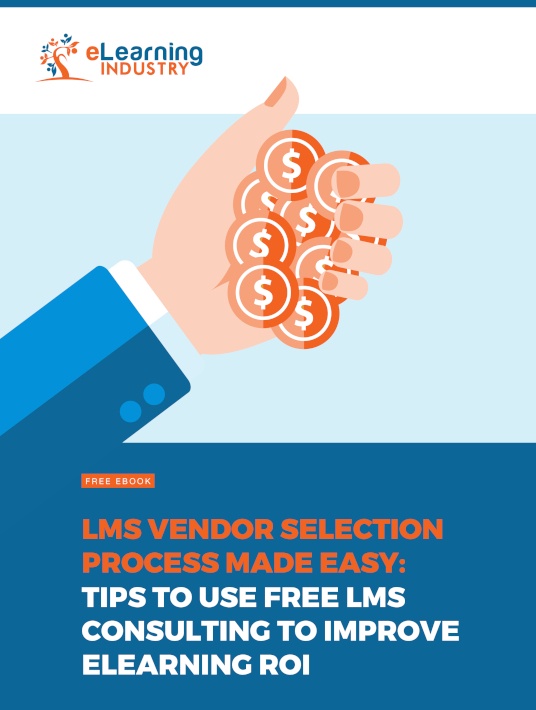How To Vet LMS Vendors After Employing Free LMS Consulting Services
They say cheap is expensive and free is a problem, since there’s sure to be a hidden cost somewhere. Fortunately, free LMS consulting doesn’t follow this golden rule. You have the opportunity to narrow down the prospects and tap into the expertise of an experienced LMS insider. Now that you’ve saved on LMS consulting fees, you want to be sure the LMS vendors you use are good. You can do the usual due diligence, ask for referrals and peruse their site. But how else can you vet them? Here are 5 ways to vet LMS vendors to ensure you’re making the right decision the first time around.

1. Image Matters
The first thing we do before a business meeting is to google. Start with the basics. Type in their name or company name and see what comes up. Next, type their name and ‘complaints’. This could bring up information that may have been hidden by a reputation manager. Don’t forget to do an image search. An image-based query can sometimes call up their awards, accomplishments, and even potential red flags. As well as give you the opportunity to evaluate their team and their level of expertise. It’s also good to verify their terms and conditions. Some LMS vendors issue punitive contracts with penalties if you opt out prematurely. These terms can make it hard to extricate yourself if you’re unhappy with their services. Lastly, you can’t really vet LMS vendors without checking their social media accounts. See if they’re active and how they interact with followers.
2. Evaluate Their Client List
It’s relatively easy for an LMS vendor to name-drop or display all past/current clients on their website. But just because they’ve worked with big names doesn’t mean they’re the right fit for you. Give weigh to testimonials, but ask questions too. It’s not enough that they worked with a big telco. Find out exactly what they did with that client. You don’t have to contact them personally. You could just shoot them an email or LinkedIn message. Confirm the nature of the project the LMS vendor covered. Get specifics, like what problem they had to solve and how the LMS helped them achieve the best outcome. This makes it easier to see if they can effectively deal with your issue. It’s also wise to peruse social media groups and ask your network if they’re familiar with the LMS. Have they used the LMS product before? How was their experience?
3. Sign Up For An LMS Free Trial
When you vet LMS vendors, test them before you use them. If it’s at all possible. Do a trial run to see how the platform suits your team and if it lives up to expectations. This also gives you the chance to see how quickly they respond to support tickets and resolve problems. For instance, the LMS vendor responds a week after you email them regarding a glitch or customization issue.
Also, think about their security protocols during the LMS free trial. NDAs are fine, but ask them what else they’ll do to protect your corporate privacy and trade secrets. This matters, because in the process of customizing your LMS, they’ll dig deep into your business, literally.
4. Schedule A Free Consultation With The LMS Vendor
Set up a meeting with the LMS vendor to discuss any potential issues and ask questions that arose during the LMS free trial. You can also use this time to see how their LMS can help you achieve your training objectives and address pain points. For example, is the system able to support personalized online training paths? Can you purchase an online asset add-on to enhance the library and improve learner engagement? They should be completely transparent about the tool’s features and support options. Rather than trying to avoid your questions and using the meeting as an extended sales pitch, it’s best to set up a consultation after you’ve already completed the LMS free trial/demo, so that you can broach follow-up topics. For instance, your team had a problem with the reporting features or encountered some concerns regarding the security protocols.
5. Research Online Reviews And Ratings
Most established LMS vendors have a track record. The caveat is that the track record may be riddled with dissatisfied users who don’t recommend the product. When you vet LMS vendors, you must research online reviews and ratings to get an inside look at how the platform has performed in the past. How would users rate the overall customer service and support options? Was the LMS easy to use, or did users struggle to master the features and functions? The key is to look for honest reviews that tie into your use case and industry. For instance, the review is in the same sector and had the same intended use for the software. These LMS reviews carry more weight, as you can determine if the product meets your needs and requirements.
In business, every dollar saved benefits your bottom line. So if you can develop your LMS strategy at no cost with free LMS consulting, you’re off to a good start. So, what next? How do you pick the right LMS vendors for your in-house training software? Run an image search. You’d be surprised what comes up. Ask specific questions about clients, getting names where possible so you can follow up. Look into the project scope and use cases themselves, to see if they’re relevant to your requirements. You can never be 100% sure of your LMS vendors, but get as close as you can. It’ll save you time and money, and preserve your own brand reputation.
Get your free LMS consultation today to receive a recommendation list of the top LMS vendors. In 4 simple steps, you can find a system that offers the best value for money and scales with your organization’s needs.
How do you prepare for your LMS consulting? Download our free eBook LMS Vendor Selection Process Made Easy: Tips To Use Free LMS Consulting To Improve eLearning ROI to discover how to determine the number of users, your must-have features and price range before your LMS consultation, and how to make good use of your LMS consultant recommendation list to choose an LMS that meets your organizational needs.







